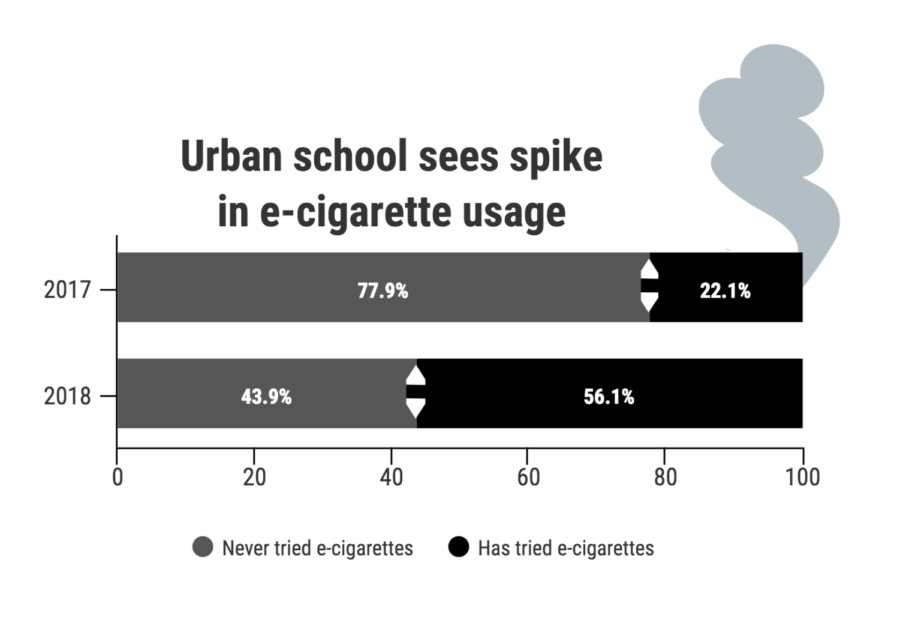San Francisco bans flavored tobacco in hopes of discouraging teen smokers
With the approval of Proposition E, San Francisco leads the United States in a fight against Big Tobacco by halting flavored tobacco sales throughout the entire city.
On June 5, 2018, San Francisco voted in favor of Prop. E, banning the sale of flavored tobacco. It went into effect on July 20, but will not impact stores until the rules and regulations are drafted. The ban includes all tobacco products with a characterizing flavor as well as menthol cigarettes, making it the strictest tobacco regulation in the United States.
The ban’s 68.39 percent voter support resulted from concern over the growing popularity of the e-cigarette brand JUUL, which is infamous for its variety of nicotine flavors. On Sept. 12, 2018, the U.S. Food and Drug Administration recognized the increase of teenage e-cigarette use as an epidemic, calling JUUL one of the leading causes.
Urban health teacher Jenn Epstein shared her concern about the e-cigarettes’ effect on the Urban community. Every year, Urban’s Health Initiative for Peer Education (HIPE), which Epstein advises, administers a school-wide survey meant to anonymously collect information on students’ drug use as well as their sexual activity and drinking experience. According to last year’s HIPE survey, 56.1 percent of students have tried e-cigarettes as opposed to 22.1 percent in 2017.
“It wasn’t until JUUL that it shot up,” Epstein said.
Most JUUL pods (the e-cigarettes’ replaceable nicotine cartridges) would be banned under Proposition E due to their flavors, which include mint, mango, and cucumber.
Despite the impending ban, an employee at Cole Street Smoke Shop was doubtful that Prop. E would actually deter teenagers from smoking. He said, with a sarcastic tone, “You’re already the cool kid if you have a JUUL, but if you’re the kid with the banned-in-your-county JUUL, you’re even cooler.”
He described how smoke shops in Oakland, who were affected by a ban that was slightly less strict than Prop. E in early 2018, were able to continue selling flavored tobacco. “You can sell any of this stuff as long as it doesn’t have any nicotine in it,” he said, “they sell all of these flavors with zero nicotine and then you just pay them and [shop owners will] add your nicotine in it and mix it up for you.”
Similarly, Epstein said, “I feel somewhat skeptical about [Prop. E]. This flavored situation is so new, and there’s so many easy workarounds. I hope it makes our numbers [of student e-cigarette smokers] go down, but I’m not sure it will.”
Despite these possible loopholes, supporters still believe that Proposition E is a crucial step in the fight against Big Tobacco.
Annie Tegan, a representative for the Campaign for Tobacco-Free Kids, said, “[The campaign] wanted to support [Prop. E] because, right now, tobacco companies target kids by marketing different flavors of electronic cigarette juices, like gummy bear and cotton candy.”
Proposition E was also supported by the American Heart Association, Michael R. Bloomberg, and many local parents, doctors, and community groups. Tegan noted that “the only people who opposed Prop. E were the tobacco companies, and I think that says a lot right there: the tobacco companies are trying to protect their profits and they’re trying to make sure they can still hook the next generation of kids on their product.”
Originally, the San Francisco Board of Supervisors approved the ban as an ordinance which was supposed to become active in April 2017, but due to the success of an opposition petition created by the RJ Reynolds Tobacco Company, Prop. E was referred to the June 5, 2018 ballot.
“Of the youth who currently consider themselves active smokers, 81 percent of them started with a flavored product,” Tegan said. “That means that the majority of kids aren’t starting with marlborettes, they’re starting with cherry flavored swisher sweets or menthol cigarettes because those flavors mask the harshness of the tobacco and makes it easier for the smoke to go down and easier for the kids to inhale.”
Despite possible loopholes, successes, and failures, Tegan said, “Proposition E really did spark a movement across the country and across California.”

